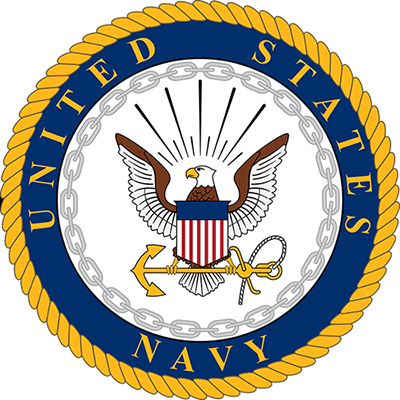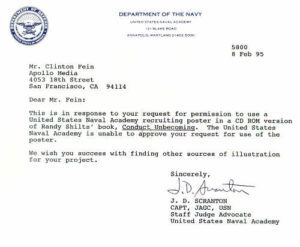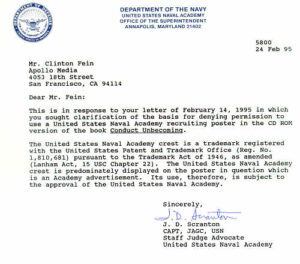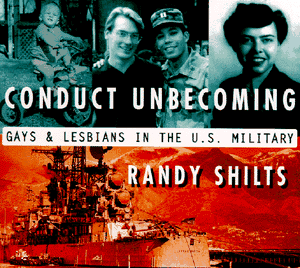An excerpt of the story from Clinton Fein's book, Nothing in Moderation
I still didn’t understand why a poster like that wasn’t in the public domain. After all, we had paid for it with our tax dollars, and its release was over twenty years ago. I wrote one letter back to captain Scranton in which I said I understood that they could not approve my request but that I wasn’t seeking approval. I was asking if a legal basis prohibited us from doing so.
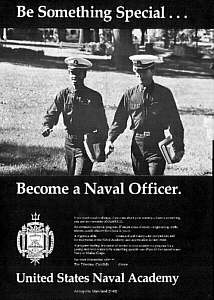 Furthermore, I added if we didn’t hear back, I would just assume that there was no legal basis to prohibit us from doing it and that we would go ahead and use it. That’s right. I was forcing the Navy to respond by declaring any non-response as an affirmation.
Furthermore, I added if we didn’t hear back, I would just assume that there was no legal basis to prohibit us from doing it and that we would go ahead and use it. That’s right. I was forcing the Navy to respond by declaring any non-response as an affirmation.
I was prepared to fight this and wasn’t prepared to back down because of everything I had read in Conduct Unbecoming. And all the homophobia I had been exposed to myself. The times I was forced to hide who I was because I was scared of revealing who I was. Terrified for my survival, fearful for what would happen to me.
Bill Clinton had already been in power for a couple of years, and six months after he was sworn in, he signed the insidious Don’t Ask, Don’t Tell policy compromise into law. At this point, it felt like we were being told that we couldn’t tell. As civilians, we still we’re being subjected to this ridiculous policy.
I was prepared to fight this and wasn’t prepared to back down because of everything I had read in Conduct Unbecoming. And all the homophobia I had been exposed to myself. The times I was forced to hide who I was because I was scared of revealing who I was. Terrified for my survival, fearful for what would happen to me.
Navy Censorship: The Correspondence
Dear Mr. Fein:
This is in response to your request for permission to use a United States Naval Academy recruiting poster in a CD ROM version of Randy Shilts’ book Conduct Unbecoming. The United States Naval Academy is unable to approve your request for use of the poster.
We wish you success with finding other sources of illustration for your project.
Sincerely,
J.D. SCRANTON
CAPT, JAG USN
Staff Judge Advocate
United States Naval Academy
This is in response to your letter of February 14, 1995 in which you sought clarification of the basis for denying permission to use a United States Naval Academy recruiting poster in the CD ROM version of the book Conduct Unbecoming.
The United States Naval Academy crest is a trademark registered with the United States Patent and Trademark Office (Reg. No. 1,810,681) pursuant to the Trademark Act of 1946, as amended (Lanham Act, 15 USC Chapter 22). The United States Naval Academy crest is predominately displayed on the poster in question which is an Academy advertisement. Its use, therefore, is subject to the approval of the United States Naval Academy.
Sincerely,
J.D. SCRANTON
CAPT, JAG USN
Staff Judge Advocate
United States Naval Academy
J.D. Scranton
Captain, JAGC, USN
Staff Judge Advocate
United States Naval Academy
Office of the Superintendent
Annapolis, MD 21402
Dear Captain Scranton:
We are writing on behalf of ApolloMedia in response to your letter to it of 24 February 1995, which states:
This is in response to your letter of February 14, 1995 in which you sought clarification of the basis for denying permission to use a United States Naval Academy recruiting poster in the CD ROM version of the book Conduct Unbecoming
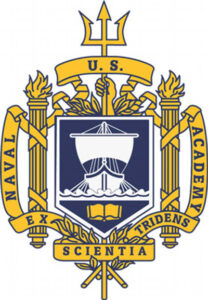 The United States Naval Academy crest is a trademark registered with the United States Patent and Trademark Office (Reg. No. 1,810,681) pursuant to the Trademark Act of 1946, as amended (Lanham Act, 15 USC Chapter 22). The United States Naval Academy crest is predominately displayed on the poster in question which is an Academy advertisement. Its use, therefore, is subject to the approval of the United States Naval Academy.
The United States Naval Academy crest is a trademark registered with the United States Patent and Trademark Office (Reg. No. 1,810,681) pursuant to the Trademark Act of 1946, as amended (Lanham Act, 15 USC Chapter 22). The United States Naval Academy crest is predominately displayed on the poster in question which is an Academy advertisement. Its use, therefore, is subject to the approval of the United States Naval Academy.
Our understanding of the salient facts is as follows: The poster in question dates from about 1972 and has been in the public domain since then. It is not copyrighted and copyright protection “is not available for any work of the United States Government,” 17 U. S. C. _105, i.e. , “a work prepared by an officer or employee of the United States Government as part of that person’s official duties.” 17 U.S.C. _101. It is a recruiting poster/advertisement with the heading “Be Something Special,” below which are the photographs of two midshipmen, and underneath the photographs is the heading “Become a Naval Officer. ” Some brief text follows, on the left side of which is the crest that you refer to. At the bottom are the words “United States Naval Academy Annapolis Maryland 21402.” One of the two midshipmen depicted is Boyd E. “Eddie” Graves, whom we understand was the Academy’s first black recruitment “poster boy” and received an honorable discharge from the Navy in 1977. Our client’s CD ROM will contain other images of Mr. Graves and related text. The other midshipman depicted in the poster is not known to our client.
The CD ROM includes the text of the book Conduct Unbecoming by Randy Shilts; the text of the Executive Summary from National Defense Research Institute (1993), “Sexual Orientation and U.S. Military Personnel Policy: Options and Assessment,” RAND, MR-323-OSD; and approximately 3,500 photographic and textual images, including photographs of gay and lesbian service members, past and present.
The CD ROM also includes images of your letter of 24 February 1995, quoted above, and your earlier letter to ApolloMedia, dated 8 February 1995, which reads as follows:
This is in response to your request for permission to use a United States Naval Academy recruiting poster in a CD ROM version of Randy Shilts’ book, Conduct Unbecoming. The United States Naval Academy is unable to approve your request for use of the poster. We wish you success with finding other sources of illustration for your project.
In the CD ROM, the images of your two letters immediately follow the image of the poster. In addition, the inside front cover of the CD ROM container states:
None of the images, photographs, and reproductions, digitized or otherwise, displayed herein or on the packaging, promotional material, or advertising material imply or are intended to imply official U.S. Department of Defense approval or endorsement of the images or opinions expressed. These images, photographs, or reproductions, digitized or otherwise, are presented for journalistic purposes only.
ApolloMedia’s CD ROM deals with a subject of intense public concern, namely, our country’s policies regarding sexual orientation and U.S. military policy. That policy has been and is the subject of acute debate in the media and in all three branches of government, i.e., the Executive Branch and Department of Defense, Congress, and in the judiciary, in various court cases. The CD ROM constitutes both a reference work and a visual commentary that is relevant and important to the debate. It is speech entitled to the greatest and strictest protection under the First Amendment to the Constitution of the United States.
The protective aegis of the First Amendment is not limited to handbills or newspapers. It extends unquestionably to new forms of electronic communications such as CD ROMs no less than it does to newspapers, books, or phonograph records. The Supreme Court of the United States has stated emphatically that “the press in its historic connotation comprehends every sort of publication which affords a vehicle of information and opinion.” Lovell v. Griffin, 303 U.S. 444, 452 (1938). As the United States Court of Appeals for the Ninth Circuit recently held in the context of investigative reporting, “The journalist’s privilege is designed to protect investigative reporting, regardless of the medium used to report the news to the public.” Shoen v. Shoen, 5 F.3d 1289, 1293 (9th Cir. 1993). “It makes no difference whether ‘the intended manner of dissemination [is] by newspaper, magazine, book, public or private broadcast medium, [or] handbill. “‘ Id., citing von Bulow v. von Bulow, 81 1 F. 2d 136, 144 (2d Cir.), cert. denied, 481 U.S. 1015 (1987). See also Cantwell v. Connecticut, 310 U.S. 296 (1940) (record).
We appreciate your identifying the United States Naval Academy’s trademark rights as the source of your concern. Our client acknowledges those rights. However, protection for trademark rights under the Lanham Act is limited to protection against another’s use of a designation to identify its business or in marketing its goods or services in a way that causes a likelihood of confusion. Such trademark rights do not override First Amendment rights.
There is no likelihood of confusion presented by ApolloMedia’s use of an image of the poster in its CD ROM. It is not making any trademark use of the Academy’s crest. It is not using the Academy’s trademark to suggest any association between itself and the Academy or that the CD ROM is produced, sponsored, certified, or approved by the Academy. Our client’s placement of the images of your two letters in immediate sequence after the poster image and its disclaimer will make clear beyond question that its use of that image is not produced, sponsored, certified, or approved by the Academy.
ApolloMedia is a publisher of CD ROMS. It is not in the business of recruiting naval officers. It has no connection with the Academy or the military or the activities conducted by either. It is not competing with the Academy. It is not using the Academy’s trademark to suggest any association with the Academy. The services rendered by the Academy and the services rendered by ApolloMedia are different and distinct. ApolloMedia, as part of its publishing services, is using the image of a poster that has been in the public domain for over twenty years. For purposes of the CD ROM, the presence of the Academy crest therein is merely referential. Accordingly, ApolloMedia is not infringing the Academy’s trademark. Instead, it is making fair use and protected First Amendment use of the poster for a vital public purpose.
We respectfully suggest that the Academy’s reliance on federal trademark law is not consistent with applicable authority. We invite your attention to the following authorities that support ApolloMedia’s use of the poster image as a noninfringing fair use protected by the First Amendment: Lanham Act, 15 U.S.C. _1114(l) (requirement that “use is likely to cause confusion, or to cause mistake, or to deceive”); Lighthawk, Environmental Air Force v. Robertson, 812 F.Supp. 1095 (W.D. Wash. 1993) (federal statute granting the Forest Service exclusive use of the SMOKEY BEAR designation held unconstitutional as applied against use in a political advertisement); Stop the Olympic Prison v. United States Olympic Committee, 489 F.Supp. 1112 (S.D.N.Y. 1980) (protected political use of poster containing the word “Olympic”); Girl Scouts of the United States v. Personality Posters Mfg. Co., 304 F. Supp. 1228 (S. D. N. Y. 1969) (protected parody of Girl Scout image and motto “Be Prepared”); WCVB-TV v. Boston Athletic Assn, 926 F. 2d 42 (1st Cir. 1991) (protected referential nonconfusing reference by TV station to the trademark “Boston Marathon”); New Kids on the Block v. New America Pub., Inc., 971 F.2d 302 (9th Cir. 1992) (protected nominative fair use by newspapers in conducting polls); Restatement (Third) of Unfair Competition _20 (1995) (likelihood of confusion test); id., comment b (the “confusion must present a significant risk to the sales or good will of the trademark owner”); id., Reporter’s Note, p. 220 (“use of another’s trademark merely to refer to the trademark owner or its products is not an infringement”); id. _25(2) (use of designation to comment on or parody the other or the other’s goods or services is subject to liability without proof of a likelihood of confusion “only if the actor’s conduct meets the requirements of a cause of action for defamation, invasion of privacy, or injurious falsehood”). For additional cases involving protected First Amendment use of U.S. government items or symbols, see the decisions of the Supreme Court of the United States in Texas v. Johnson, 491 U.S. 397, 407 (1989)(flag); Regan v. Time, Inc., 468 U.S. 641, 644 (1984) (currency); Schact v. United States, 398 U.S. 58, 62-3 (1970)(military uniform).
If the Academy were simply asserting its federal trademark right as a ground for refusing permission, the matter could probably end there since our client acknowledges and is not infringing the Academy’s trademark. The Academy does not have to grant permission and ApolloMedia does not need it. However, our client informs us that following your first letter and before your second letter, in a telephone conversation between you and Clinton Fein, President of ApolloMedia, you warned ApolloMedia to halt production or be “in big jeopardy” if the poster was reproduced in the work. I would appreciate your letting me know your version of the conversation. If you indeed made such statements and thereby intended to threaten litigation and such threats represent the official position of the U.S. Naval Academy, then we respectfully suggest that you retract them immediately. (See, for example, the plaintiff’s summary judgment in the Lighthawk case, supra.) Can it really be in the interests of the Academy to threaten litigation over an old recruiting poster in the context of the current debate over military policy? Will candidates who want to “be something special” be attracted to an institution that treats its crest as more important than the First Amendment?
We look forward to hearing from you.
Sincerely,
COOLEY GODWARD CASTRO
HUDDLESON & TATUM
Michael Traynor
Media Response
A Navy lawyer told ApolloMedia, which produced of the CD-ROM, that if it used a 1972 recruitment poster in Conduct Unbecoming, it would be “in big jeopardy.”
The Navy claimed that the US Naval Academy crest was a registered trademark. The poster features Ed Graves, an Annapolis graduate and the Navy’s first black poster boy. The Navy stopped using the poster after learning that Graves is gay.
Refusing to bend, ApolloMedia informed the Navy of its intent to use the image anyway, and for a moment, it looked as if neither side would blink. But after mulling over the looming publicity nightmare (ApolloMedia called a press conference to announce the Navy’s actions), the Navy withdrew its threats.
Defying a Navy threat of “big jeopardy,” San Francisco multimedia producers are releasing their new CD-ROM on gays in the military this week with a photo of a disputed recruiting poster intact.
After delaying its release for nearly a week because of the Navy snafu, ApolloMedia President Clinton Fein announced Tuesday that the CD-ROM, complete with poster, would be in stores Thursday or Friday.
“We think the (Navy’s) real motivation is prejudice, and we fortunately are not service members and don’t have to be silenced,” Fein said. “We can tell and we will. The bottom line for us is the poster, in our opinion, is in the public domain.”
He added, “The worst that can happen is the Navy will sue us. Well, sue us.”
Naval Academy spokesman Noel Milan in Annapolis, Md., said, “This is preposterous. They asked us for permission and we denied them permission.”
He said that because the poster displays the U.S. Naval Academy crest, which is trademarked, the Navy has sole authority over its commercial use.
He would not reveal if the Navy plans to sue, saying only, “We’re evaluating the situation.”
Interviews, photos added
The CD-ROM adds video of interviews with current and former gay and lesbian service members, plus family photos, to the text of Shilts’ book, a history of the U.S. military’s exclusion of gays.
One of the added interviews was with Boyd E. “Eddie” Graves, who appeared with another midshipman in the disputed recruiting poster. Graves said he was the first African American used in a Naval Academy recruiting poster; five years later he was honorably discharged because he was gay.
The CD-ROM includes the poster as part of a photo album of gay and lesbian service members.
In denying permission for use of the poster, Naval Academy lawyer Capt. J.D. Scranton told Fein that the poster falls under federal trademark protections.
In a subsequent phone call, according to Fein, Scranton added that the second midshipman in the poster had not granted his permission for its use, and that the academy didn’t want to appear to be endorsing the CD-ROM.
Threat of “big jeopardy”
Scranton threatened “big jeopardy” if the poster wasn’t removed, Fein said.
“I could only assume (he meant) litigation,” Fein said.
“I didn’t think he’d come out here and beat me up.”
Fein said he asked for permission as a routine courtesy, but believes he has the right to use it without approval under First Amendment guarantees of freedom of expression.
Before releasing the CD-ROM, ApolloMedia lined up a promise of legal help from Cooley, Godward, Castro, Huddleson & Tatum, Fein said.
Jill Alofs, whose Mill Valley business Total Clearance specializes in getting clearances for multimedia productions, said most government work is in the public domain “but you cannot assume that it is.”
Wed, 8 Mar 1995
SAN FRANCISCO — The Navy reversed course Wednesday on a recruiting poster featuring a midshipman later discharged for being gay, and will allow the image to illustrate a book on homosexuals in the military.
ApolloMedia had asked permission to use the 1972 poster in a CD-ROM version of “Conduct Unbecoming,” the late Randy Shilts’ book on the history of gays and lesbians in the armed forces.
“It showed us we could stand up for what we believe is right,” said Clinton Fein, president of the company.
The poster depicted two U.S. Naval Academy midshipmen, including Lt. Ed Graves, the first black featured on a Navy recruiting poster. Graves was later discharged as a homosexual, and gave the poster to ApolloMedia for use with Shilts’ book, the company said.
The Navy initially refused ApolloMedia permission to use the poster. Company officials pledged to include it anyway and said the software would reach store shelves by Friday.
Naval Academy spokesman Noel Milan in Annapolis, Md., said Wednesday that last-minute negotiations between the two sides resolved the issue.
Along with the poster, ApolloMedia will include a disclaimer and two letters from the Navy saying use of the image was not authorized.
`That satisfied Naval Academy concerns,” said Milan.
ApolloMedia officials — who earlier criticized the Navy for “hypocrisy” on the issue — said they were not surprised the Navy backed down.
`They did the right thing,” Fein said. “And it was the CD-ROM that armed us to know they would back down.”
Shilts’ book shows that taking on the Navy works, he said.
When gays went public and fought, they received honorable discharges. When they didn’t, Fein said, they were dishonorably discharged.
Company spokesman Scott Shafer said ApolloMedia had stopped production of “Conduct Unbecoming” for a week while trying to resolve the dispute. He said company lawyers finally concluded the company had the right to use the poster and were prepared to do legal battle.
The company says the CD-ROM package includes the full text of Shilts’ book plus 2,000 additional images, government reports on gays in the military, and video interviews.
`Our aim is to put a human face and a human voice to Randy Shilts’ important research,” said Tracy Cohen of ApolloMedia. “We also wanted to elevate this issue and honor these members of the armed services using the latest technology.”
The CD-ROM version of “Conduct Unbecoming,” based on Randy Shilts’s masterpiece of a book by the same name, provided a comprehensive and visually impactful portrayal of the struggles faced by gay men and lesbians in the US military.
The inclusion of filmed segments featuring servicemembers, key litigators and politicians added a powerful emotional element to the narrative.
The e-Post feature represented the first time a user could use tech to contact senators and congress members. Rolling Stone magazine called the CD-ROM evolutionary.
Overall, the groundbreaking CD-ROM used images and video to effectively humanize lesbian and gay servicemembers.
